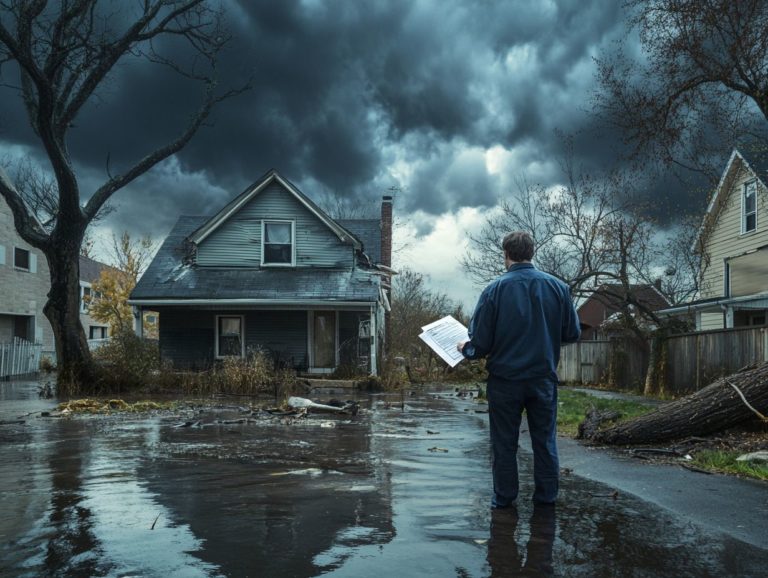Understanding Homeowners Insurance vs. Renters Insurance
Navigating the world of insurance can feel overwhelming, especially when deciding between homeowners and renters insurance.
Both types of policies play vital roles in protecting your assets, yet they cater to distinct living situations and individual needs. Whether you own your home or rent an apartment, grasping the nuances of these insurance options is crucial for safeguarding your belongings and ensuring your financial future.
This article will break down the key differences, coverage benefits, and important considerations, empowering you to make an informed decision.
Contents
- Key Takeaways:
- What is Homeowners Insurance?
- What is Renters Insurance?
- Differences Between Homeowners Insurance and Renters Insurance
- When is Homeowners Insurance Necessary?
- When is Renters Insurance Necessary?
- Choosing the Right Insurance Policy
- What Are Coverage Limits and Deductibles?
- Frequently Asked Questions
- What is the difference between homeowners insurance and renters insurance?
- Do I need both homeowners insurance and renters insurance?
- What does homeowners insurance cover?
- What Does Renters Insurance Cover?
- Can I Have Both Homeowners Insurance and Renters Insurance?
- How Much Do Homeowners Insurance and Renters Insurance Cost?
Key Takeaways:

- Homeowners insurance covers both the physical structure of a home and personal belongings.
- Renters insurance only covers personal belongings.
- Renters insurance is typically more affordable and has lower coverage limits compared to homeowners insurance.
- Consider factors such as the value of your belongings, the location of your home or rental, and any specific coverage needs when choosing an insurance policy.
What is Homeowners Insurance?
Homeowners insurance is your shield against potential risks, offering financial protection for your home, liability for injuries, and coverage for personal property. It typically safeguards you against a range of risks, such as fire, water damage, and theft, ensuring you re covered in times of unexpected loss.
Additionally, it often includes provisions for additional living expenses if your home becomes uninhabitable due to a covered event. This ensures your assets are well protected.
Recognizing the importance of liability coverage is crucial. This aspect shields you from claims arising from injuries or damages that occur on your property.
When searching for insurance quotes, take the time to compare policies. This allows you to find premiums and deductibles that suit your financial situation. Remember, the cost of your premiums can fluctuate based on your chosen coverage level and the deductibles you agree to those amounts you pay out of pocket before your insurance kicks in.
Creating a home inventory is a vital step toward ensuring accurate coverage. By documenting all your personal belongings, you prepare for a smoother claims process if needed.
What is Renters Insurance?
Renters insurance is your safety net when renting a home or apartment, shielding your personal belongings from unexpected events like theft, fire, or water damage. Unlike homeowners insurance, which covers the physical structure, renters insurance focuses on protecting your possessions while also offering liability coverage for any injuries that might occur on the property.
This policy is essential for renters, providing financial support in the event of unforeseen losses and even covering additional living expenses if your rented space becomes uninhabitable.
Understanding the intricacies of renters insurance can elevate your peace of mind. This policy not only protects your personal items like furniture and electronics but also offers crucial liability coverage if someone gets injured on the premises. Should your apartment become unlivable due to unexpected circumstances, this insurance can help offset those additional living expenses.
Don t miss out! Insurance premiums can vary wildly based on several factors, including the coverage options you choose and where you live. That s why it s critical to thoroughly explore and compare different policies to uncover the best fit for your needs.
Differences Between Homeowners Insurance and Renters Insurance
Understanding the differences between homeowners insurance and renters insurance is essential for you, whether you’re a homeowner or a tenant. These policies serve distinct purposes, and you can learn more about what’s the difference between home and renters insurance as they offer varying levels of protection for your property and personal belongings.
Homeowners insurance typically covers the physical structure of your home, while renters insurance is designed to protect your personal property within the rented space.
Homeowners insurance includes liability coverage for injuries that occur on your property, whereas renters insurance offers similar protection on a different scale. Each type of insurance comes with its own costs, coverage levels, and requirements, making it vital for you to select the right policy based on your individual needs.
Coverage and Benefits
Understanding coverage and benefits is key for protecting your assets. Homeowners insurance includes protection for your home, personal property, and liability for injuries on your property.
Renters insurance, on the other hand, mainly covers personal belongings and liability as a tenant. Both types may also cover extra living expenses if your home is uninhabitable due to a covered event like a fire.
Many insurance providers offer great discounts for bundling policies or having a clean claims history. Be aware of these potential savings!
While covered perils may differ, you can expect protection against theft, vandalism, and certain natural disasters. Personal liability coverage is crucial, as it protects you from legal claims related to accidents on your property.
Many renters don t realize their valuable items can be insured against loss or damage. Knowing about discounts can significantly lower your premium, making coverage more affordable for everyone.
Costs and Requirements

Costs and requirements for homeowners and renters insurance can vary greatly. Factors like location, property value, and chosen coverage influence each policy.
Homeowners insurance usually has a higher premium because it covers a physical structure. Renters insurance is often more budget-friendly, mainly focusing on personal belongings.
Your location plays a big role in premium costs. Living in a high-risk area for natural disasters or crime can increase your expenses significantly.
Past claims history also affects your rates. Frequent claims can lead to higher premiums as insurers may see you as a risk.
When choosing coverage, carefully assess your needs. Higher limits or added coverage options can increase costs, so weigh your choices wisely.
Compare quotes and delve into policy details to make informed decisions that fit your financial situation.
When is Homeowners Insurance Necessary?
Homeowners insurance is essential for anyone owning a home. It protects your investment against risks like property damage from disasters, theft, and liability claims.
This insurance covers the structure of your home and your personal belongings, keeping you financially secure during unforeseen events.
Many mortgage lenders require homeowners insurance for loan approval, highlighting its importance in achieving homeownership.
Owning vs. Renting a Home
Owning a home versus renting one brings distinct insurance requirements. Homeowners insurance is essential for property owners, while renters insurance is your safeguard as a tenant. Understanding the differences in home insurance types goes beyond mere preference; it’s a vital aspect of your financial security.
For those who own real estate, full insurance protection is essential to protect the investment in both the property and the surrounding land. As a homeowner, you face risks that can significantly impact your financial security, such as natural disasters or fire damage.
Renters should concentrate on safeguarding their personal belongings within someone else’s property. This includes furniture, electronics, and all those little treasures you ve accumulated.
Liability coverage is crucial for both homeowners and renters. Homeowners may be liable for injuries occurring on their property. Tenants, on the other hand, need protection against injuries that happen in the rental space. This highlights the unique insurance needs of each group, ensuring they re adequately covered in their specific circumstances.
When is Renters Insurance Necessary?
If you’re renting a home, renters insurance is a smart choice! It offers vital protection for your personal belongings and liability coverage in the event of accidents within your rented space.
With increasing incidents of theft and property damage, having a renters policy provides peace of mind, ensuring that your possessions are safeguarded against unforeseen losses.
Renters insurance is often affordable, making it a practical choice for those who don t own the property they call home.
Renting a Home or Apartment
When you rent, securing renters insurance is a savvy move to protect your property and minimize financial risks from unexpected incidents. This insurance shields your belongings from theft, fire, or water damage.
It also offers liability coverage in case someone gets injured on your rented property. If your rental becomes uninhabitable due to a covered event, renters insurance can help cover additional living expenses, preventing you from facing financial hardship.
For anyone living in a rented space, understanding what renters insurance encompasses is essential. Commonly covered items include:
- Furniture
- Electronics
- Clothing
This coverage helps you recover costs if these items are lost or damaged. The liability coverage acts as a critical buffer against potential lawsuits, offering protection in case of accidents involving guests.
Plus, having coverage for additional living expenses means that if disaster strikes, you can find temporary accommodation without incurring overwhelming out-of-pocket costs. This allows you to focus on rebuilding your life rather than worrying about financial uncertainty.
Choosing the Right Insurance Policy

Choosing the right insurance policy is a pivotal decision for both homeowners and renters. It provides essential protection for your property and personal belongings against a range of risks.
Homeowners insurance and renters insurance offer different types of coverage, so it’s crucial for you to understand what is the difference between renters and home insurance based on your unique needs.
By meticulously comparing quotes from various insurance companies, you can make informed choices that align with your financial goals and risk appetite. This approach ultimately gives you the power to secure the best coverage tailored to your specific situation.
Don’t wait! Start your search for the perfect insurance today!
Factors to Consider
When selecting an insurance policy, it s essential to weigh several factors to ensure you receive ample protection against potential risks, such as property damage and liability claims.
Key elements to consider include the type of coverage you need think personal property protection and liability coverage. Also, consider the costs tied to insurance premiums and deductibles.
Understanding the specific requirements of homeowners insurance is crucial. Similarly, it’s important to know what renters insurance entails, so you can make informed decisions that cater to your unique living situation and financial landscape.
Your personal circumstances, including lifestyle choices, the value of your possessions, and where you live, can significantly influence your decision-making process.
For instance, if you reside in a high-risk area, you might prioritize comprehensive coverage over saving a few bucks. Meanwhile, someone with fewer valuables might lean toward a policy with a lower premium.
Regularly reviewing your insurance costs is crucial. These costs can fluctuate based on risk changes, market trends, or personal choices.
Overlooking these variations could result in inadequate coverage or unexpected financial burdens when you need protection the most.
What Are Coverage Limits and Deductibles?
Understanding coverage limits and deductibles is essential for anyone considering homeowners or renters insurance. These two factors are important parts of defining the protection your policy offers.
Coverage limits are the maximum amount your insurance will pay for a claim, whether it’s for property damage or liability. Deductibles are the amounts you pay before your insurance helps cover the rest.
By grasping these elements, you ll be better equipped to navigate your insurance options and select a policy that truly aligns with your needs.
What They Mean and How They Affect Your Policy
The terms coverage limits and insurance deductibles are fundamental concepts that play a crucial role in shaping both homeowners and renters insurance policies. They significantly influence your overall costs and protection levels.
Coverage limits define how much the insurance company will pay out in the event of a claim. Deductibles determine how much you must pay out of pocket before receiving any payout. Understanding these terms is vital for effectively managing your insurance expenses and ensuring adequate protection for your personal property and liability claims.
For example, if you have a policy with a coverage limit of $250,000 for property damage but face a repair bill of $300,000, you ll be responsible for that extra $50,000.
On the flip side, opting for a higher deductible usually means lower monthly premiums. However, it also places more financial responsibility on you when it comes time to file a claim.
To make informed decisions, consider how much risk you re comfortable with and what you can afford in deductibles. Assess the value of your belongings as well.
By evaluating your personal risk tolerance and weighing potential costs against benefits, you can find the right balance that offers adequate coverage without putting too much strain on your budget.
Frequently Asked Questions
What is the difference between homeowners insurance and renters insurance?

Homeowners insurance provides coverage for the structure of a home and its contents. In contrast, renters insurance covers only the contents of a rental property. Homeowners insurance also includes liability coverage for accidents that occur on the property, while renters insurance does not.
Do I need both homeowners insurance and renters insurance?
The need for homeowners or renters insurance depends on whether you own or rent your home. If you own your home, homeowners insurance is recommended to protect your investment. Conversely, if you are renting, renters insurance can protect your personal belongings and provide liability coverage.
What does homeowners insurance cover?
Homeowners insurance typically covers damage to the physical structure of a home, as well as personal belongings inside the home. It also provides liability coverage for accidents that occur on the property. Some policies may also cover additional living expenses if the home becomes uninhabitable due to a covered event.
What Does Renters Insurance Cover?
Renters insurance protects your belongings in a rental property. It covers damage or loss from events like fire, theft, or vandalism.
This insurance can also help protect you from lawsuits if accidents happen on the property.
Can I Have Both Homeowners Insurance and Renters Insurance?
If you own a home and rent out another property, you can have both types of insurance. However, renting part of your home may not cover your tenant’s belongings under your homeowners insurance.
In that case, your tenant should buy their own renters insurance policy for protection.
How Much Do Homeowners Insurance and Renters Insurance Cost?
The cost of these insurances varies based on location, coverage limits, and deductibles. Generally, renters insurance is cheaper because it usually covers only personal belongings and liability.
Always compare quotes from different providers to find the best coverage at a price that fits your budget.




